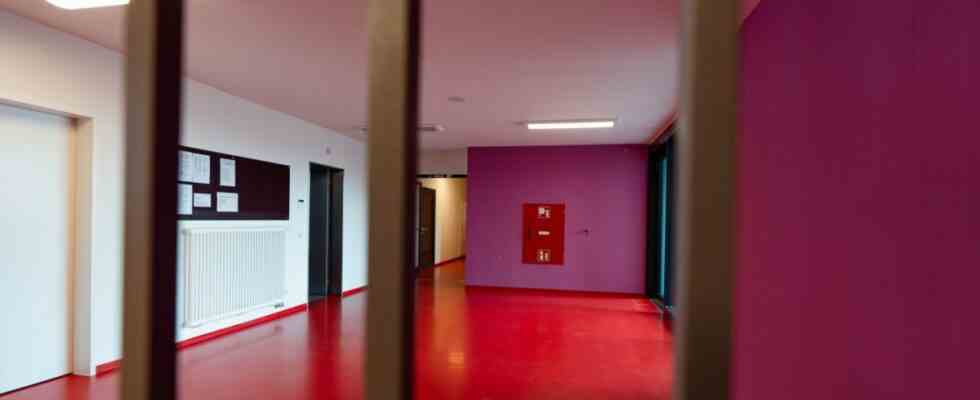An obligation to leave the country, says Gülseren Demirel (Greens), does not turn people into criminals. That’s why it’s not right if in Bavaria the prison law is simply applied to detention pending deportation. A separate legal framework is necessary, such as in Baden-Württemberg. The Greens recently presented a draft in the state parliament. If detention pending deportation “has to be ordered as the very last resort, then it must not be carried out like criminal detention,” demanded the spokeswoman for her parliamentary group on asylum. Rather, the aim is to “do it as humanely as possible and as little restrictive as necessary”. The draft by the Greens states that the basic rights of accommodated people are currently “not completely guaranteed” – the legal situation is “inadequate”. Advisory boards for detention centers should also be set up to review practice. She asked, according to Demirel in the plenary session, for the further consultation to deal “benevolently” with the initiative.
In view of the high number of refugees, immigration has once again become a major political issue. Municipalities in Bavaria complain that they can hardly accommodate so many people. Most of those arriving are Ukrainians: 155,000 have registered since the war began a year ago. In addition, a total of 38,850 people from countries such as Syria, Afghanistan, Turkey or Iraq sought asylum in Bavaria in 2022, most of whom were also entitled to protection. In total, more people have arrived than at the height of the refugee movement in 2015/2016. The CSU wants to take up the issue of migration again in the election year, the current development already requires it.
However, Prime Minister Markus Söder and his party do not want to fall back into the polarizing, sometimes aggressive debate of 2015 and the 2018 election campaign, as has been heard. Especially given that Bavaria needs labor migration; Söder traveled to Albania last week to recruit skilled workers. The population will only accept people moving in from abroad and taking in people in need of protection “if those who, according to our legal system, have no right to stay leave our country again,” said Interior Minister Joachim Herrmann (CSU) recently as a slogan. He sees “considerable deficits” in the federal government, which always only emphasizes the humanitarian side, but criminally neglects the limitation and control of immigration and repatriations. Last year, Bavaria deported a little more rejected asylum seekers, 2046 people – but not yet reached the pre-Corona level. According to Herrmann, “zero point zero” happens in the federal government, which has to take care of readmission agreements with countries of origin.
In order to enforce deportations, Bavaria in particular often detains people who are obliged to leave the country beforehand. According to Pro Asyl, this was the case for 1,500 people in 2019; 3,500 were deported that year. In the federal state of Berlin, on the other hand, only 18 people were imprisoned in the same period and almost 1,000 were deported. A total of 110 refugees are currently awaiting deportation in Bavaria in the Eichstätt, Erding and Hof institutions. In 2022 there were more than 1600. According to Section 62 of the Residence Act, detention pending deportation is permitted in exceptional cases, for example if there is a risk of going into hiding. The police then file a detention order, which a judge decides on. However, the deprivation of liberty is to be limited to the “shortest possible duration,” according to the law. And according to EU guidelines, it shouldn’t really feel like a prison either, explains lawyer Peter Fahlbusch, who specializes in migration. These are people who have often had bad experiences and are often only to be taken to another country, such as Italy, for their asylum procedures. “You shouldn’t treat them like criminals.”
Criticism of Eichstätt
But this is exactly where Bayern seems to have problems. The Greens are not the only ones pointing this out. The Coburg district court also recently sharply criticized the conditions in the facility in Eichstätt. Deportation detention centers must “avoid the impression of a prison environment as far as possible,” it said. The court wanted to let the high walls pass to avoid an escape. In Eichstätt, however, the windows were also barred, the judges complained. In addition, inmates are not allowed to use their cell phones or wear their own clothes. Lawyer Fahlbusch explains that people who are obliged to leave the country are often treated like normal prisoners. A law on detention pending deportation could change this and lay down precise rules.
However, it is not likely to happen any time soon. In any case, the government factions CSU and Free Voters immediately signaled rejection of the green draft. Karl Straub (CSU) said that he could not promise benevolent treatment, as Demirel wanted, but “proper dealings with each other” in the debate. “It’s very clear that here in Bavaria, the fundamental rights of detainees awaiting deportation are respected and constantly improved,” he said. Separation of prisoners, privacy and access of aid organizations or lawyers are clearly regulated. According to Straub, the idea of the green law is “inflated” and ultimately unnecessary. Alexander Hold (FW) also argued in the same direction. It is also about people without a right to stay, who do not leave the country voluntarily and for whom a court came to the conclusion that without custody, deportation would be at risk. “It’s nothing inhuman.”
A debate actually without foaming at the mouth, according to the new CSU line. All the more striking, by the way, in contrast to the right wing. Christoph Maier (AfD) said: The law should prevent deportations on the home stretch, which “a sluggish and almost incompetent state” had at least brought to detention pending deportation; that is the goal of “left-green enemies of the people”. President of the Landtag Ilse Aigner (CSU) warned him for the choice of words.

